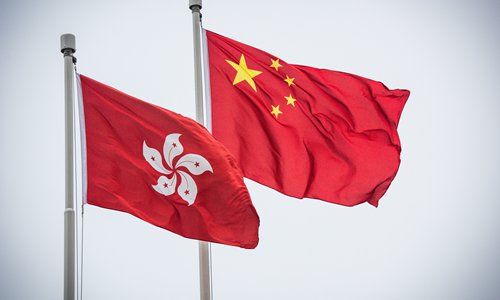HOME >> OPINION
Hong Kong elite need to update their national recognition
By Tian Feilong Source:Global Times Published: 2019/9/9 22:28:41

Photo: IC
Amid the hurly-burly of protests, echo of the slogan "Revive Hong Kong, revolution of our times" rang aloud as city scholar Chow Po-chung gloated over "our golden era" to fight for so-called democracy, justifying the rampaging actions of demonstrators. What kind of "times" are the radical protesters expecting? What are the core values and political appeals of their "times?" Apparently, the divergence in ideology and values is the deeper reason of the anti-extradition bill protests.
The radical protesters' "times" are Westernized times that closely relate to colonial modernity and Western values. Their main political appeal is freedom and democracy. But under the "one country, two systems" principle and the Basic Law, Hong Kong's freedom has been fully guaranteed. Hong Kong's freedom and democracy must be in line with the sovereignty, security and development interests of the "one country." However, Hong Kong opposition groups' "revolution of our times" aims at overthrowing "one country, two systems," and they are pursuing a so-called universal democracy. Their "times" also refer to absolute autonomy and even Hong Kong secession.
Such radical thoughts are influenced by Hong Kong's political and cultural elite. From the pan-democracy camp, to civil disobedience, to the "valiant" rioters, it shows how deeply such colonial thoughts are rooted among Hong Kong elite. In the highly Westernized Hong Kong elite' opinion, modernity, as the core standard of civilization, is nothing but a whole set of concepts and systems of colonialism. They use Hong Kong nativism memories to coordinate with such colonial modernity, and they feel no identification with the "one country" system.
Since Hong Kong returned to China in 1997, these elite have set up their cultural dominance in Hong Kong, based on Western cultural advantages and media networks. They remain vigilant against patriotic education and education on the country's politics and history. They identify with the UK, and even believe that Hong Kong's high degree of autonomy comes from the British government's endeavor in the Sino-British Joint Declaration. They welcome the UK's continued interference in Hong Kong, completely ignoring the basic historical fact of Hong Kong's return to China. These elite neither don't understand the Chinese central government's constitutional design, nor the real basis of Hong Kong's high degree of autonomy, prosperity and stability. Although they know it is impossible to make the city secede from China, they started political movements again and again. The movements have been veneered by democracy so as to gain support of foreign forces.
The so-called complete autonomy is their long-lasting goal but Hong Kong's secession is opportunistic - they can wreak havoc in the country even though they fail. These elite and youth educated by them want to prove they are aligned with the West by radically opposing their own country. They rush to "the end of history" regardless of the future proposed by the great rejuvenation of Chinese nation.
Deeply affected by radical ideas, Hong Kong elite have been completely wrong in understanding the "one China, two systems" principle and the national strategy. "Five demands" proposed by radical protesters aimed at paralyzing the SAR government and exempting protesters. They intend to call white as black and claim the SAR government is totally wrong, the police are responsible for all the chaos and that protesters are right and innocent.
They place abstract freedom and democratic values above the rule of law in Hong Kong, seeking their extreme political goals by breaking the bottom line of rule of law. These elites want to establish an anarchic system in Hong Kong to replace the executive-led system established by the Basic Law. The extreme political power grab has de facto become a color revolution in Hong Kong.
In the anti-extradition bill chaos, these Hong Kong elite act as missionaries of Western values, which have dominated the democratic concept and movements in Hong Kong under the policy of "one China, two systems." Such being the case, they would certainly oppose the integration of "two systems" in every aspect ranging from systematic link like the extradition bill to economic connection like the Guangdong-Hong Kong-Macao Greater Bay Area.
Their misunderstanding of China's development is dragging down the city. These elite have become hurdles to the city's development and governance, and they are paying a heavy price for being outdated.
They must update their concept of the new era, re-recognize China and the world and go in line with the central government so that they can maintain their leadership and influence in Hong Kong. Otherwise, they will be marginalized together with the decline of the West.
The author is associate professor at Beihang University in Beijing and member of Beijing-based Chinese Association of Hong Kong and Macao Studies. opinion@globaltimes.com.cn
Newspaper headline: HK elite need to develop national identity
Posted in: VIEWPOINT